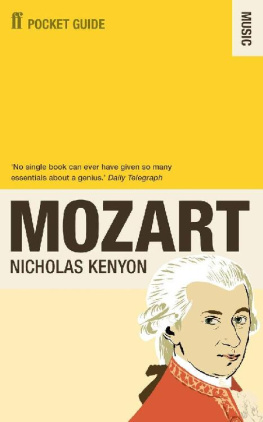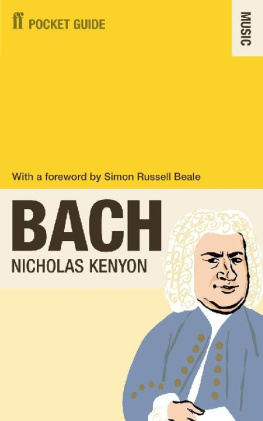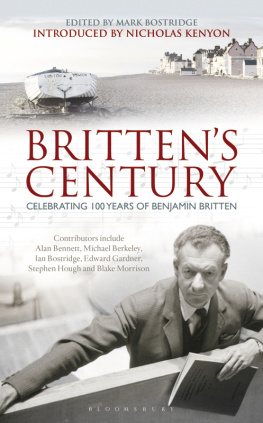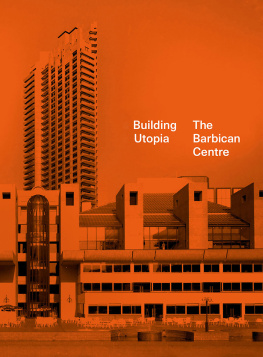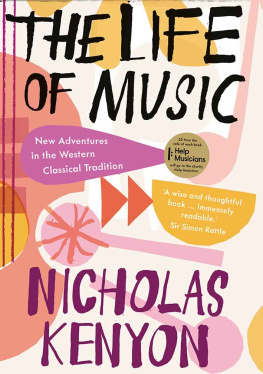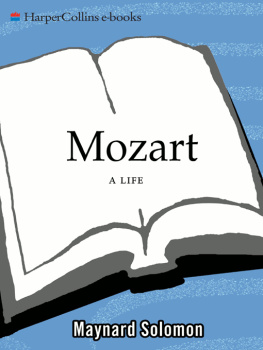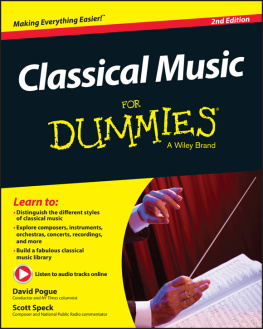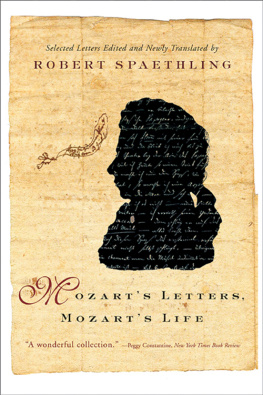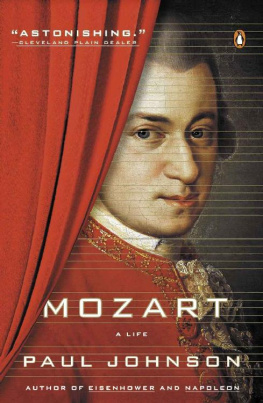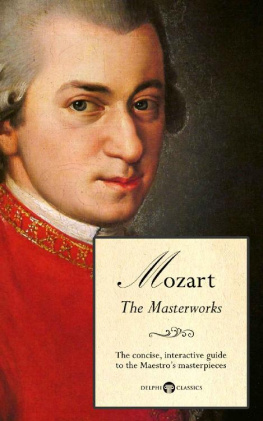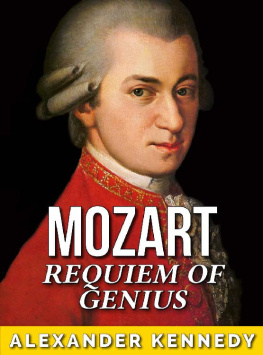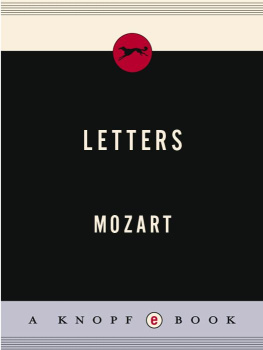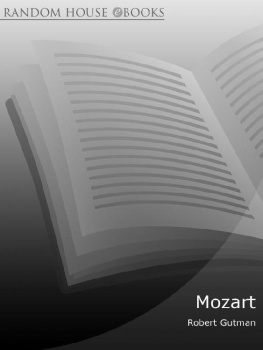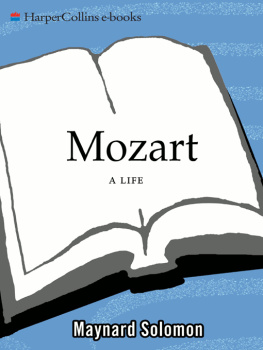Introduction
As we all know, Mozart pushed things a little too far.
Carl Friedrich Zelter, 1798
Can you put everything you need to know about Mozart in your pocket? Perhaps no composer in the history of Western music has been more written about, dissected, mythologised and fantasised over. A Google search just a year before the 250th anniversary of his birth offers some 7,930,000 current items about Mozart. Of the making of theories about Mozarts life, death, relationships, personal habits, not to mention his music, there is no end. The number of books published about Mozart ranks with those about Shakespeare, Jesus Christ and (his nearest rival among composers) Wagner. He was the subject of an acclaimed play, Amadeus , which has gone round the world since it was first seen in London in 1979, and became an even more popular (though completely transformed) film in the 1980s, which re-embedded myths about the man at the heart of our understanding of his music. It was doubtless partly because of Amadeus that Mozart, rather than any other classical composer, was in Time magazines top ten cultural figures of the millennium. Today, my mobile phones predictive text spells Mozart for me, but not Beethoven or Haydn. His music chimes in every Muzak-infested lift or restaurant or shopping centre, and in these days of eternal waiting for the call centre to answer, Mozarts must be the music you hear most often when you are on hold. Even if you claim to know nothing about classical music, you have heard of Mozart, and heard Mozart.
But just when you are about to write Mozart off as overexploited and over-exposed, there is the sudden impact of the music, utterly direct, communicative yet emotionally elusive, simple yet infinitely complex, which has been moving listeners for over two centuries in myriads of different ways, offering different qualities to new generations. Sometimes it seems possible to read an infinite variety of meaning into Mozarts music, so open is it to interpretation and opinion, so varied in the performance styles and techniques that can be used to realise it for a contemporary audience. Equally, Mozart has now become a commercial brand: to market the supposed benefits of music on spatial-temporal reasoning in children and adults, The Mozart Effect became a trademark. In this and in so many other ways, Mozart has become something completely different from Mozart: it is a creation of our times, made in our own image.
We will never fully disentangle the man and the music from the myth, nor should we; for it is in the mythic power of Mozarts story that much that is so important about him survives, and it is in those stories told about him that we have articulated what we want to believe of composers, of geniuses, of those who die young, of those who create something that lasts. That is why the stories are so significant, whether or not they are entirely true.
In Mozarts case, the myths began to be created the moment he died. Mozarts wife Constanze reflected that: on the day of his death in 1791, she is reported to have been distraught, to have curled up beside his dead body in his bed, but is also supposed to have penned in her husbands album the words: Mozart never to be forgotten by me or by the whole of Europe now thou too art at peace eternal peace!! O! could I soon be joined with thee for ever. She dated this 5 December 1791, the day of his death but it is more likely that, rather than being her immediate reaction, those sentiments were actually those that, much later, in her new role of protector of his reputation, she felt she ought to have articulated at that crucial moment. Yet that makes almost more poignant the desperate vacuum that Mozarts early death left behind, and the inability of those around him to cope with his astonishing legacy of which the endless sagas surrounding the incomplete Requiem are only the most famous example.
Of Mozarts life, there is almost too much evidence hundreds of letters, diaries, catalogues, newspaper reports and so much else, although many of these are not about the things that really matter. How much can we believe of the welter of communication in Mozarts astoundingly vivid and turbulent letters, one of the most remarkable personal testimonies to have survived from any great artistic figure? In the biographical literature they have so often been taken as the unvarnished truth, and yet increasingly we come to realise that they are hedged around with special pleading, deliberate carelessness and dissimulation qualities which do, of course, tell us much about the composer, but are more elusive than taking him at face value. The intoxicating aspect of the surviving Mozart evidence, including the posthumous stories and legends, is that it is all so vivid. The testimonies pulsate with life, and we feel, even at more than two centuries distance and cultural worlds away, that we can make an immediate connection with them. That is one reason for Mozarts continuing relevance to us, yet the imagined closeness is a dangerous thing, for too often we want to believe that he had our own way of thinking, feeling and behaving.
(It is amazing how resilient both the positive and negative images of Mozart prove to be. Early in 2005, the Berlin State Library unveiled what it claimed, to some disbelief, was a lost portrait of Mozart by Johann Georg Edlinger, bought in 1934 and forgotten since. As it doesnt look much like what we know of him, it was said to show a graying and podgy Mozart, with heavy bags under his eyes, caused by his flamboyant living in his home town of Salzburg [ sic he actually lived at this time in Vienna] which revolved around rich foods, heavy drinking and womanising, all of which may have contributed to his premature death This report provoked an immediate reply in the Sunday Telegraph from a furious correspondent: Mozart was a good husband He lived with his family all of whom were good practising Catholics. He had girlfriends and was a flirt but there is no evidence he was unfaithful to his wife.)
If you want to read what is absolutely, certainly true about Mozart, this book may be a disappointment, because the story of what has happened to him since his death has irretrievably coloured that simple tale. But at the moment that marks a quarter of a millennium since Mozart was born, the most we can do, given the infinite variety of possibilities in his music, is to provide some context to help us hear Mozarts music freshly, and make of it what we will. Each listener will have a different reaction, just as every performer reinterprets him: here are some guides around that amazing output; from them, create your own Mozart.
The enormous amount of scholarly work on Mozarts life and music that has taken place in recent years has not yet led to a fully formed picture that can replace the pioneering work of nineteenth-and twentieth-century biographers. So many pieces of the jigsaw seem to have been thrown up in the air that it would be impossible to write a coherent, organic, musical and personal story of Mozart right now. There have been stimulating and questioning biographies, by Wolfgang Hildesheimer, Volkmar Braunbehrens and Maynard Solomon; there is a wealth of new information about his music in the work of the New Mozart Edition and its critical commentaries (written with the utmost care, read with the minimum of attention, as one scholar wryly noted); there is a rich new sense of context from analysts and historians who are studying Mozart alongside his contemporaries and in his cultural sphere.

